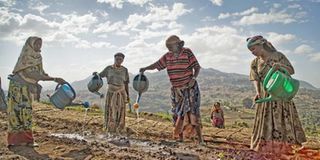Uganda needs $400m to adapt to climate change

The current weather patterns have become so unpredictable that farmers do not know which season to expect. File photo
What you need to know:
Climate change is so unpredictable in Uganda yet many people’s lives depend on its outcome.
Climate change and increasingly intense and disastrous weather events are having great impact on the most vulnerable countries across the globe.
Uganda is among the Least Developed Countries and the most vulnerable despite its low contribution to Greenhouse Gas (GHG) emissions that are responsible for global warming.
As world governments, business leaders and civil society meet at ongoing climate summit in Paris, France the real cost of adapting for climate change in Uganda emerged in a new report.
The government commissioned study, the Economic assessment of the impacts of climate change in Uganda, indicates it will cost Uganda about $406 million over the next five years (2015–2020) to fully adapt to climate change.
The study provides economic evidence on the current and future costs associated with climate variability and predicted climate change, and the necessary adaptation measures for different sectors at both national and local scales.
The study conducted with support from Climate and Development Knowledge Network (CDKN), Makerere University and other partners says on annually, Uganda will have to spend about 5 per cent of net official development assistance received and 3.2 per cent of total government revenues (excluding grants) to stem the impact of climate change.
The details
Dr Revocatus Twinomuhangi CDKN’s country leader for Uganda and lecturer at Makerere University Department of Geography, says the study looks into cost of adaptation in the water, agriculture, energy and infrastructure sectors.
“Without the study, we did not have enough evidence to convince policy makers, in Uganda, about what is at stake with climate change yet our economy is depended on environment and natural resources,” says Twinomuhangi. “In the past, there has been detachment among policy makers looking at climate change only as an environmental issue not a development issue. With such a study the costs are clear. We cannot transform Uganda from poverty to a middle income country by 2040 without tackling climate change.”
The cost
As the 21st Conference of Parties (COP 21) to the United Nations Framework Convention on Climate Change (UNFCCC) enters the second and final week to negotiate a lasting climate agreement, this report warns Uganda could see the cost of inaction on climate change by 2025 become 20 times the costs of adaptation.
“The cost of inaction is 20 times greater than the cost of adaptation: inaction is estimated at between $3.1 billion-5.9 billion per year by 2025, which is more than 20 times the proposed adaptation budget,” the report indicates.
Twinomuhangi says “Cost of adaptation will in the medium term rise to about $ 1billion. Uganda relies heavily on international funding so we need funds out of this COP21.”
Uganda is already experiencing the impacts of climate variability and associated economic losses. The 2008 floods and landslides caused losses of approximately 3 per cent of the value of all food and cash crops that year. In 2011, Uganda is also estimated to have lost 16 per cent of the total annual value of crops as a result of extreme weather.
Uganda is already among countries in Eastern Africa that are experiencing El Nino phenomenon characterised by unusually long rainfall conditions with the possibility of flooding and landslides.
Uganda National Meteorological Authority predicts the country will average rainfall during the month of December and January over Uganda. Uganda last experienced severe El Nino in 2007, which saw areas of Teso, Lango and Acholi sub-regions experience flooding. Mountainous areas such as Sironko, Kapchorwa, Mbale, Bundibugyo and Kabale also face the increased risk of landslides during severe El Nino.
Climate change will affect most of its key economic sectors. Although most development plans recognise that climate resilience must be at the heart of policies for growth and development, turning these plans into reality for most vulnerable people requires a lot of funding.
“Its about coping with the impact of climate change, you know the droughts and floods are coming and you are not going to stop so in case they come, how are people prepared to cope?” says Twinomuhangi. “In the agriculture sector we are looking for more investment in climate smart technologies like irrigation, many in Uganda dependent on subsistence farming so we must find technologies that are affordable for subsistence farmers, says Twinomuhangi. “In the transport we must take into account predicted changes in weather when constructing bridges and roads.”
Highlights
In the water sector, the report shows Uganda needs to look into harvesting and storage mechanisms like building valley dams and using water efficiently. Energy efficiency is another highlight as the report shows there’s need for investing more in climate resilient energy like hydropower stations and diversification through solar energy and wind.
The evidence from the study has already informed Uganda’s Intended Nationally Determined Contribution (INDC), which shows Uganda’s future climate plans with commitment to climate adaptation and the mitigation of greenhouse gases as part of a new, universal global climate agreement that will be decided at the summit.
Back in Paris, next week ministers of environment will be negotiating the deal based on the draft climate agreement. Countries so far agree that there should be a global goal for adaptation included in any new climate deal but negotiators from climate vulnerable countries like Uganda will be pushing that the deal doesn’t allow the global temperatures to increase beyond 1.5 degrees Celsius. Uganda together with developing countries is pressing hard for more adaptation funding from the Paris climate deal.
Fatima Denton, director at the UN Economic Commission for Africa, speaking at the Development and Climate Days side event at COP21 said “it is not enough to tell the poor that they will be poorer with climate change. It is not making a difference.”
“We must link vulnerable people to business opportunities that can increase their resilience in the face of increasing impacts of climate change. Adaptation funding is important and entrepreneurial skills of people living in most vulnerable countries must be priority,” she said.
Civil society organisations are also emphasizing the need for more adaptation measures and finance.
“Finance is a core part of the UN climate framework and a key driver of the outcome,” says Brandon Wu, senior policy analyst, Action Aid. “Without finance, there’s no support for the poorest and most vulnerable. There’s no just transition. There’s no motivation for developing countries to make ambitious commitments.”
The negotiations will go on until December 11 when a climate deal is expected. Hopefully, Uganda and countries facing such heft climate adaptation costs will get the deal that promised to significantly avail solutions.
The Paris conference
Negotiators paving the way for a global climate change agreement in Paris have cleared a major hurdle, producing a draft accord in record time and raising hopes that a full week of minister-led talks can now clinch a deal despite many sticking points.
No part of the deal has been finalised because in the end it is likely to be a tradeoff between developing countries’ demands – particularly for financing to help cope with the impacts of locked-in climate change – and wealthier nations’ insistence that over time all countries properly account for the progress they have made towards emission reduction goals.
[email protected]




